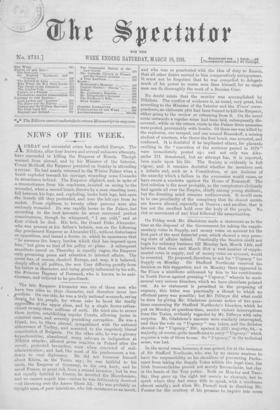The late Emperor Alexander was one of those men who
Lave two sides to their character, and therefore incur two verdicts. On one side, he was a truly national monarch, caring deeply.„..for his people, for whose sake he faced the deadly oppotattn of the upper ,class, and by a single- decree enfran- chised twenty-three millions of serfs. He tried also to secure them justice, establishing regular Courts, allowing juries in criminal cases, and severely punishing corruption. He was a friend, too, to Slays abroad, sympathised with the national abhorrence of Turkey, and assented to the singularly liberal constitution of Bulgaria. On the other side, he was a gloomy hypochondriac, abandoned many reforms in indignation at Nihilist attacks; allowed gross cruelties in Poland after the revolt; protected favourites, even when convicted of mal- administration ; and had, like most of his predecessors, a ten- dency to ruse diplomacy. He did not forswear himself about Khiva„ as the Tories say ; he was faithful to his uncle, the Emperor of Germany, to his own hurt; and he saved France, at great risk, from a second invasion ; but he was not equally faithful to Greece, he deserted the Macedonians, and we cannot acquit him—unless he was deliberately deceived —of throwing over the Ameer Shore Ali. Ho was probably an upright man, of pure intentions, who felt resistance as an insult,
and who was so penetrated with the idea of duty to Russia, that all other duties seemed to him comparatively unimportant. It must not be forgotten that he was compelled to delegate much of his power to worse men than himself, for no single man can do thoroughly the work of a Russian Czar.


































